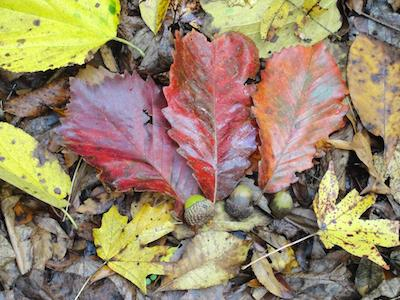
Fallen leaves contribute to a naturally pollinator friendly and sustainable landscape.
December 7, 2023 - With falling foliage in full force, the age-old tradition of raking leaves beneath our trees comes to the forefront. However, there’s been a major push of late by entomologist and author Dr. Doug Tallamy and many others to avoid the practice and let them lie, especially under shade trees.
Tallamy has written several influential books, including Bringing Nature Home: How You Can Sustain Wildlife with Native Plants, Nature's Best Hope: A New Approach to Conservation that Starts in Your Yard, and The Nature of Oaks: The Rich Ecology of Our Most Essential Native Trees. I once heard him speak in Lufkin and hopefully one day we can bring him to Tyler to share his views on ecological landscaping.
Here are some reasons to consider not raking and discarding your leaves this fall.
Biodiversity Boost: Leaves on the ground create a microhabitat that supports a diverse array of organisms. In this leaf litter, insects find refuge, amphibians seek shelter, and beneficial microbes thrive. It's a bustling ecosystem that contributes to the overall biodiversity of the garden.
Soil Enrichment: As leaves break down, they become a natural source of organic matter, enriching the soil beneath your trees. This organic mulch improves soil structure, retains moisture, and enhances nutrient levels, providing a healthy foundation for your trees and surrounding plants. Think of them as free mulch and compost.
Natural Fertilizer: As they have for millions of years, decomposing leaves release essential minerals into the soil, acting as a slow-release fertilizer that nourishes your trees and promotes overall soil health and friability.
Water Conservation: A leafy layer on the ground acts as a protective shield, reducing water evaporation from the soil. This not only conserves moisture but also helps maintain a more stable soil temperature. As a result, your trees are better equipped to withstand both drought and excessive rainfall, both of which occur regularly here.
Pollinator Paradise: Many pollinators, including various species of native bees, butterflies, and moths, overwinter in the leaf litter. The layer of leaves provides a protective cover, shielding them from harsh weather conditions. By leaving leaves in place, you're offering a refuge for these pollinators during the colder months.
Erosion Prevention: The fallen leaves act as a natural barrier, preventing soil erosion caused by wind and water. This protective layer stabilizes the soil structure, ensuring that your trees' root systems remain securely anchored in place.
Time and Energy Savings: Let's face it – raking leaves can be a time-consuming and energy-draining task. By embracing the natural process of leaf decay, you not only save yourself the effort but also contribute to a more sustainable and low-maintenance garden.
The seemingly simple act of leaving leaves beneath your trees can have far-reaching ecological benefits. By appreciating the ecological role of leaves and allowing them to remain beneath trees, you create a more sustainable and pollinator-friendly environment.
Greg Grant is the Smith County horticulturist for the Texas A&M AgriLife Extension Service. He is the author of Texas Fruit and Vegetable Gardening, Texas Home Landscaping, Heirloom Gardening in the South, and The Rose Rustlers. You can read his “Greg’s Ramblings” blog at arborgate.com and read his “In Greg’s Garden” in each issue of Texas Gardener magazine (texasgardener.com). More science-based lawn and gardening information from the Texas A&M AgriLife Extension Service can be found at aggieturf.tamu.edu and aggie-horticulture.tamu.edu.








